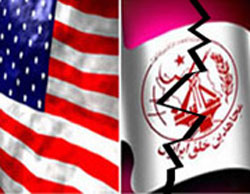Since 1997, the Iranian opposition group known as the Mujahedeen-e Khalq (MEK) has been 

Clearly, the MEK’s amenability to U.S. interests reflects only the group’s latest incarnation. Nonetheless, opponents of the MEK’s terrorist designation are willing to overlook prior transgressions if it means gaining a supposedly non-violent ally in the battle to undermine Iran.
There are several problems with this line of thinking, however. For one, withdrawing the MEK’s terror designation would undeniably exacerbate tensions with Iran. Though last month’s nuclear talks went relatively well, this situation could nosedive quickly with tacit American support for the MEK. Supreme Leader Ali Khamenei was himself a victim of an attempted assassination by the MEK in 1981. Iraq too is hostile towards the MEK, considering that for years the organization was supported by Saddam Hussein and may have participated in state repression.
It’s also not apparent that the MEK could achieve much in Iran, at least not as a legitimate political force. The MEK is widely despised by the Iranian people, including Iran’s reformist Green Movement, not least because of allegations that the MEK fought alongside Saddam in the Iran-Iraq War. It’s preposterous to think that an organization with so little public support could actually foster democratic government. American support for the MEK would only harm the encouragingly positive relations between the U.S. and the people of Iran.
Regardless of the political ramifications, the MEK may still actually qualify as a terrorist organization. The State Department states that the group still has the capability and intent to engage in terrorist acts. Indeed, there are allegations that the recent assassinations of Iranian nuclear scientists betray a Mossad-MEK alliance of sorts. Though some MEK members in Iraq have relinquished their weapons to American troops, the organization still has a global network of trained operatives and bomb-makers who have not reliably demonstrated a commitment to non-violence.
Though the United States and the Mujahedeen-e Khalq may share a common enemy, this is hardly a sufficient reason for the U.S. to remove the MEK’s terrorist designation. The Iranian people have tellingly disavowed the MEK, a group that incidentally has never been brought to justice for assassinating American citizens or its role in the Iran Hostage Crisis. Thus for both political and ethical reasons, it’s clear that the MEK should remain a designated terrorist organization.
by Sean Feely – Diplomacist



